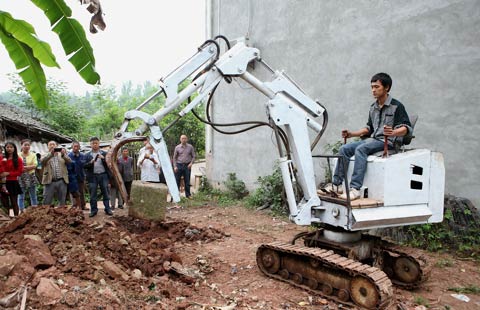Standards rising for elderly healthcare
Updated: 2015-05-07 07:42
By Xu Wei(China Daily)
|
||||||||
China will explore the use of the Internet, cloud computing and big data to transform care for the aged and further boost the use of e-commerce among seniors, according to Zou Ming, vice-minister of civil affairs.
Zou said the country will look to employ the "Internet Plus" initiative to transform home-based care for the elderly.
"We will also push forward more widespread use of information technology in areas of aged care and community services, and improve the use of e-commerce among seniors," he said in his keynote speech at a forum on the development of the senior services industry on Wednesday.
The Internet Plus initiative is a plan proposed by Premier Li Keqiang this year to upgrade traditional industries to take advantage of the Internet.
China is facing problems associated with an aging population. More than 15.5 percent of the population, or 212 million people, were age 60 or above by the end of 2014.
The number could reach 300 million, or 18 percent, by 2025 and 400 million, or 28 percent, by 2034, according to estimates by the China's National Working Commission on Aging.
"The country's population also features a large number of elderly people who are disabled and who are faced with empty nests and poverty," Zou said.
The country will accelerate the drafting of standards for care of the elderly - including building standards for nursing homes - to improve quality, he said.
Zhang Meiying, vice-chair of the National Committee of the Chinese Political Consultative Conference, said at the forum that a talent shortage remains the biggest challenge in the country's elder-care sector, largely due to low social status and lack of professional training.
"The demand and supply of services also vary greatly between different areas. Some nursing homes are faced with an insufficient number of beds, while some have a shortage of attendants," she said.
One of the major challenges in incorporating the Internet with elderly care services is to develop the habit of using the Internet, especially the mobile Internet, among seniors, said Wei Guangpei, a social worker under the Home Care Serving Association of Guangzhou, Guangdong province.
"It takes a long time for seniors to accept new technologies. That is why we should make the design as simple as possible when designing products for them," he said.
Wei said community services, including healthcare, remain indispensable as the country pushes forward home-based care.
"The technologies only enable easier connections and communication. The quality of services is still the key for the elderly," he said.
xuwei@chinadaily.com.cn

 Ten photos you don't wanna miss - May 7
Ten photos you don't wanna miss - May 7
 Siberian tiger cubs in NE China
Siberian tiger cubs in NE China
 The wonders of the Yaxi Expressway
The wonders of the Yaxi Expressway
 China joins rehearsal for Victory Day parade in Moscow
China joins rehearsal for Victory Day parade in Moscow
 Man impresses with home-made excavator
Man impresses with home-made excavator
 Blossoms a boon for tourism
Blossoms a boon for tourism
 Camel caravan on the Silk Road
Camel caravan on the Silk Road
 Met Museum celebrates China with annual gala
Met Museum celebrates China with annual gala
Most Viewed
Editor's Picks

|

|

|

|

|

|
Today's Top News
China pledges continued help as Nepal rebuilds
Annual China-US air passenger trips top 6m
Investors tee up in US golf paradise
Met gala draws Chinese fashion bloggers' criticism
Understanding culture called key for foreign businesses in China
US authorizes ferry service to Cuba
China Daily's website takes top spot in readership
Xi will honor soldiers during Russia trip
US Weekly

|

|






